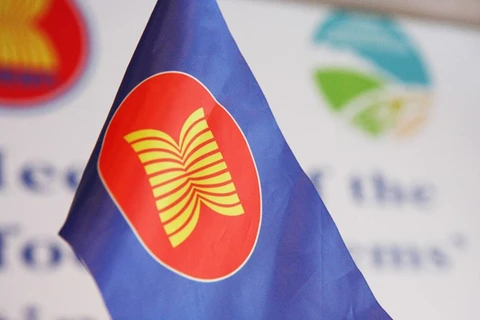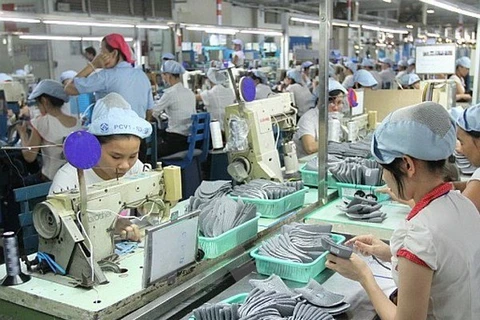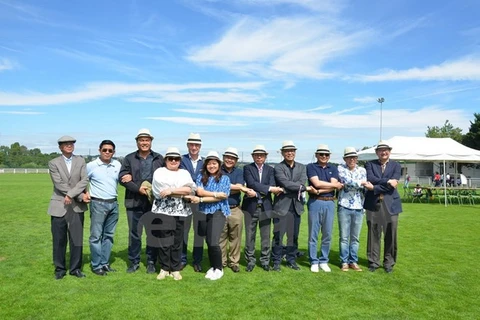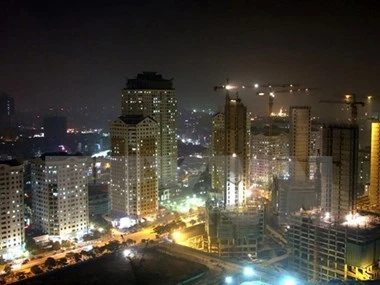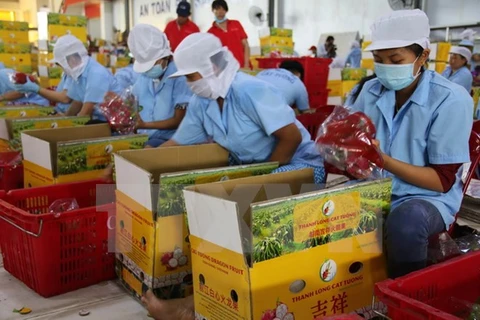Hanoi (VNA) – With its goodwill, endeavours, enthusiasm and responsibility, Vietnam has significantly contributed to the common achievements of the Association of Southeast Asian Nations (ASEAN), Deputy Prime Minister, Foreign Minister Pham Binh Minh has written in an article marking the group’s 50th founding anniversary.
In the article, Deputy PM Minh recalled the formation of ASEAN in Bangkok, Thailand, on August 8, 1967 with Indonesia, Malaysia, Singapore, Thailand and the Philippines as its founding members.
“ASEAN was born to create a firm foundation for common actions in order to enhance cooperation in Southeast Asia in the spirit of equality and partnership, contributing to peace and progress in the region,” he wrote.
After admitting Brunei in 1984, Vietnam in 1995, Laos and Myanmar in 1997, and Cambodia in 1999, ASEAN now brings together ten members. The first ASEAN Summit in 1976 demonstrated the group’s greater attention and stronger political commitments to regional cooperation.
The ASEAN Free Trade Area (AFTA), which was established in 1992 as the outcome of the first 25 years of economic cooperation of the group, has created an important foundation for the establishment of the ASEAN Economic Community.
Formed in 1994 in the spirit of promoting peace and security through dialogue and cooperation in Asia-Pacific, the ASEAN Regional Forum (ARF) initiated dialogue and consultation mechanisms on security and political issues in the region, the Deputy PM added.
He also recalled the signing of the ASEAN Charter in 2007, turning ASEAN from a merely cooperation organisation into a legal entity.
Despite close geographical locations, the ASEAN member countries have different political systems, cultures, languages and development levels. However, the gaps have been narrowed and the establishment of the ASEAN Community on December 31, 2015 opened up a new chapter in history of ASEAN, bringing ASEAN cooperation to a new height.
Besides, ASEAN has stepped up collaboration with countries outside the region in an effort to take advantage of practical support and assistance from partners, while consolidating and maintaining its central role in the region, Deputy PM Minh wrote.
He stressed that results of parliamentary cooperation and people-to-people diplomacy have contributed to diversifying the picture of the ASEAN Community in the future.
The official also pointed out a range of difficulties and challenges facing the group, caused by adverse impacts of competition between world powers as well as rapid developments of the regional and international situation.
Against the backdrop, the Deputy PM underlined the need for the ASEAN member countries to make stronger political commitments, carry forward intra-bloc solidarity and connectivity, seriously implement programmes and plans, respect common principles and standards, and harmonise national with regional interests.
He highlighted Vietnam’s 22-year membership in ASEAN, during which the country has made every effort to accelerate the admission of other Southeast Asian nations to the group, and contribute to defining development targets and orientations, and making decisions in ASEAN.
The official mentioned Vietnam’s hallmarks in hosting the 6th ASEAN Summit in Hanoi in December 1998 and assuming the Chair of the ASEAN Standing Committee in 2000-2001 and the ASEAN Chair in 2010.
Since the ASEAN Community took shape at the end of 2015, Vietnam and other ASEAN member countries have actively built the community, strictly implemented commitments and raised initiatives in many fields. Worthy of note, Vietnam is one of the two best performers in implementing priority measures set in the ASEAN Economic Community Blueprint.
Vietnam has also made significant contributions to expanding and strengthening cooperation between ASEAN and its partners, and successfully assumed the role of coordinator for relations between ASEAN and China (2009-2012), ASEAN and the EU (2012-2015) and ASEAN and India (2015-2018).
As an active member, Vietnam has played a key role in promoting solidarity and unity in ASEAN as well as its central role, especially in maintaining peace and security to serve the region’s development and boosting cooperation in prioritised economic sectors.
The country has taken the initiative in putting forth action plans and proposing initiatives and feasible projects regarding social welfare, education, employment and environmental protection, aiming to raise people’s living standards.
Deputy PM Minh pledged that Vietnam will work harder to promote practical cooperation between ASEAN and its major partners, and uphold the roles played by ASEAN and the country itself in relations with countries and organisations worldwide.
ASEAN is of strategic significance to Vietnam, he stressed, adding that with the resolve to ensure sustainable development, for the interest of present and future generations, with people as the centre, it is hoped that the ASEAN Community would develop sustainably and prosperously.-VNA
In the article, Deputy PM Minh recalled the formation of ASEAN in Bangkok, Thailand, on August 8, 1967 with Indonesia, Malaysia, Singapore, Thailand and the Philippines as its founding members.
“ASEAN was born to create a firm foundation for common actions in order to enhance cooperation in Southeast Asia in the spirit of equality and partnership, contributing to peace and progress in the region,” he wrote.
After admitting Brunei in 1984, Vietnam in 1995, Laos and Myanmar in 1997, and Cambodia in 1999, ASEAN now brings together ten members. The first ASEAN Summit in 1976 demonstrated the group’s greater attention and stronger political commitments to regional cooperation.
The ASEAN Free Trade Area (AFTA), which was established in 1992 as the outcome of the first 25 years of economic cooperation of the group, has created an important foundation for the establishment of the ASEAN Economic Community.
Formed in 1994 in the spirit of promoting peace and security through dialogue and cooperation in Asia-Pacific, the ASEAN Regional Forum (ARF) initiated dialogue and consultation mechanisms on security and political issues in the region, the Deputy PM added.
He also recalled the signing of the ASEAN Charter in 2007, turning ASEAN from a merely cooperation organisation into a legal entity.
Despite close geographical locations, the ASEAN member countries have different political systems, cultures, languages and development levels. However, the gaps have been narrowed and the establishment of the ASEAN Community on December 31, 2015 opened up a new chapter in history of ASEAN, bringing ASEAN cooperation to a new height.
Besides, ASEAN has stepped up collaboration with countries outside the region in an effort to take advantage of practical support and assistance from partners, while consolidating and maintaining its central role in the region, Deputy PM Minh wrote.
He stressed that results of parliamentary cooperation and people-to-people diplomacy have contributed to diversifying the picture of the ASEAN Community in the future.
The official also pointed out a range of difficulties and challenges facing the group, caused by adverse impacts of competition between world powers as well as rapid developments of the regional and international situation.
Against the backdrop, the Deputy PM underlined the need for the ASEAN member countries to make stronger political commitments, carry forward intra-bloc solidarity and connectivity, seriously implement programmes and plans, respect common principles and standards, and harmonise national with regional interests.
He highlighted Vietnam’s 22-year membership in ASEAN, during which the country has made every effort to accelerate the admission of other Southeast Asian nations to the group, and contribute to defining development targets and orientations, and making decisions in ASEAN.
The official mentioned Vietnam’s hallmarks in hosting the 6th ASEAN Summit in Hanoi in December 1998 and assuming the Chair of the ASEAN Standing Committee in 2000-2001 and the ASEAN Chair in 2010.
Since the ASEAN Community took shape at the end of 2015, Vietnam and other ASEAN member countries have actively built the community, strictly implemented commitments and raised initiatives in many fields. Worthy of note, Vietnam is one of the two best performers in implementing priority measures set in the ASEAN Economic Community Blueprint.
Vietnam has also made significant contributions to expanding and strengthening cooperation between ASEAN and its partners, and successfully assumed the role of coordinator for relations between ASEAN and China (2009-2012), ASEAN and the EU (2012-2015) and ASEAN and India (2015-2018).
As an active member, Vietnam has played a key role in promoting solidarity and unity in ASEAN as well as its central role, especially in maintaining peace and security to serve the region’s development and boosting cooperation in prioritised economic sectors.
The country has taken the initiative in putting forth action plans and proposing initiatives and feasible projects regarding social welfare, education, employment and environmental protection, aiming to raise people’s living standards.
Deputy PM Minh pledged that Vietnam will work harder to promote practical cooperation between ASEAN and its major partners, and uphold the roles played by ASEAN and the country itself in relations with countries and organisations worldwide.
ASEAN is of strategic significance to Vietnam, he stressed, adding that with the resolve to ensure sustainable development, for the interest of present and future generations, with people as the centre, it is hoped that the ASEAN Community would develop sustainably and prosperously.-VNA
VNA

